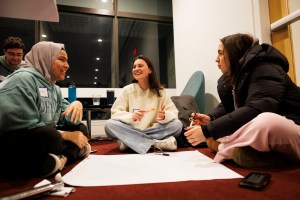Tag: History
-
Campus & Community
This month in Harvard history
April 14, 1944 — In honor of the 50th anniversary of the American movie industry, Warner Brothers presents the Harvard Film Service with a reprint of a 150-foot film of Mark Twain made in 1907 by Thomas Edison with a hand-cranked camera.
-
Campus & Community
Eleven HILR students honored for dedication
University Marshal Jackie O’Neill honored 11 members of the Harvard Institute for Learning in Retirement (HILR) last week for their dedication to lifelong learning. The April 4 ceremony was held at the Harvard Faculty Club and was attended by friends and family of the honorees, who are all near or actual nonagenarians. Also in attendance…
-
Science & Tech
An ocean of bad tidings
Jeremy B.C. Jackson earned his first chops as a scholar by studying the ecological impacts of an event that unfolded over the last 15 million years: the formation of the Isthmus of Panama, dividing the Atlantic and Pacific oceans and setting off profound evolutionary oceanic and terrestrial changes.
-
Arts & Culture
Self discusses gender, feminism, privacy
Brown University cultural historian Robert O. Self — a Radcliffe Fellow this year — made a name for himself with his book “American Babylon” (Princeton University Press, 2003). He was the first scholar to connect the civil rights struggle with postwar white flight to the suburbs, and the tax incentives that made suburbanization possible.
-
Campus & Community
This month in Harvard history
April 25, 1674 — The Harvard Corporation orders that “freshmen of the Colledg shall not at any time be compelled by any Senior students to goe on errands or doe any servile work for them. And if any shall præsume to send them in times injoyned for study both the sender and the goer shall…
-
Campus & Community
Brandt awarded prestigious Bancroft Prize
“The Cigarette Century: The Rise, Fall, and Deadly Persistence of the Product That Defined America,” by Amalie Moses Kass Professor of the History of Medicine Allan M. Brandt, has been selected to receive a Bancroft Prize from Columbia University.
-
Health
Panel discusses history, future of alternative therapies
The history of alternative and complementary medical treatments can inform the medicine of today. That was the message of “Sectarian (to Unorthodox to Alternative) to Complementary Medicine: What Historical Perspectives can Tell Modern Medicine,” an afternoon of talks sponsored by the Countway Library’s Center for the History of Medicine on March 26.
-
Arts & Culture
The story behind ‘Storied Walls’
In March 2001, Bill Saturno, a newly minted Harvard Ph.D., was in Guatemala searching for recently uncovered hieroglyphics as a research associate of the Peabody Museum. It turned out that his guides were overbooked and his planned expedition had to be canceled. As a sort of consolation prize, the company offered Saturno a three-hour Land…
-
Campus & Community
This month in Harvard history
March 13, 1944 — Between matinees at Boston’s RKO Theatre, composer-pianist Duke Ellington visits Paine Hall to give a 20-minute lecture on the blues (“Negro Music in America”). At the keyboard, Ellington illustrates his talk with “Sophisticated Lady,” “Subtle Slough,” “Dancers in Love,” “Don’t Get Around Much Anymore,” and “Mood Indigo.”
-
Nation & World
The Holy Land comes to Florida as a theme park
Little did a Harvard scholar who studies sacred spaces imagine that she would find the Holy Land in Florida. Several years ago, while chatting with her niece, a resident of the Sunshine State, Joan Branham, visiting associate professor of women’s studies and early Christianity and Judaism and acting director of the Women’s Studies in Religion…
-
Nation & World
Wisse explores mutations of Jewish power
If the Jewish rebellion led to a diaspora that lasted millennia, it also prompted a sea change in the nature of Judaism, said Ruth R. Wisse, Harvard College Professor and Martin Peretz Professor of Yiddish Literature. An energetic commentator on Jewish culture, Wisse delivered a Humanities Center lecture this week (March 17) summarizing her new…
-
Arts & Culture
African American National Biography launched
From Aaron, a former slave without a last name, through Paul Burgess Zuber, a 20th century lawyer and professor, the recently published African American National Biography (Oxford University Press, 2008) is the most extensive and inclusive collection of biographical information about African American lives ever published. The African American National Biography (AANB), co-edited by Henry…
-
Nation & World
Where the intellectual and spiritual intersect
Kevin Madigan wishes he could have saved Anne Frank. Today, he repeatedly saves her memory. Madigan, professor of the history of Christianity at Harvard Divinity School (HDS), teaches the College freshman seminar “The Holocaust, History and Reaction,” which addresses the Jewish genocide through the study of a variety of texts, literature, and film. The course…
-
Arts & Culture
Mining a trove of old ballads gives women a new voice
In the mid-1930s, Milman Parry, a professor in the Department of the Classics at Harvard, traveled throughout Yugoslavia to research and record folk songs. Assisted by his former student Albert Lord, Parry spent 15 months on the road and returned to Harvard with innumerable texts and sound recordings of more than 1,500 epic songs. Their…
-
Campus & Community
This month in Harvard history
March 23, 1639 — In recognition of John Harvard’s recent bequest, the Great and General Court of Massachusetts Bay Colony orders “that the colledge agreed upon formerly to bee built at Cambridg shalbee called Harvard Colledge.”
-
Arts & Culture
The first civil rights movement
Most of us think of the Civil Rights movement as something that took place in the transitional 1950s and the tumultuous 1960s. It’s seen as a cultural artifact squeezed between the defiance of Rosa Parks (1955) and the demise of Martin Luther King Jr. (1968).
-
Arts & Culture
Exploring the shadows
“If you wouldn’t tell Stalin, don’t tell anyone else!” In the early years of the Cold War, a billboard near an atomic bomb testing site in New Mexico urged passersby to keep research developments close to the vest. Secrecy was of the utmost importance in that era — and not just in scientific circles —…
-
Health
History of Women in Medicine fellowship material due March 1
The Foundation for the History of Women in Medicine (FHWIM) is offering two fellowships to support research conducted at the Center for the History of Medicine and its Archives for Women in Medicine, located at Harvard Medical School’s Countway Library.
-
Arts & Culture
Ancient text has long and dangerous reach
Ask a well-read individual to list the most dangerous books in history, and a few familiar titles would most likely make the cut: Hitler’s “Mein Kampf,” Marx and Engels’ “The Communist Manifesto,” Chairman Mao’s “Little Red Book.”
-
Campus & Community
This month in Harvard history
February 1950 — A capacity Sanders Theatre crowd hears Eleanor Roosevelt discuss “The World Struggle for Human Rights,” as guest of Harvard’s United Nations Council. She urges the U.S. to ratify the U.N. Covenant of Human Rights, the legal underpinning to the U.N. Declaration of Human Rights.
-
Arts & Culture
HCL maps set in stone
Three years ago, Big Dig officials approached David Cobb and his staff in the Harvard Map Collection with a request: Help them design a map for the North End parks that would illustrate how Boston had changed in the centuries since its founding. When the parks officially opened in November 2007, not one but seven…
-
Arts & Culture
HUL launches extensive ‘Contagion’ collection
The Harvard University Library (HUL) Open Collections Program recently launched http://ocp.hul.harvard.edu/contagion. Created with support from Arcadia, the new collection, titled “Contagion: Historical Views of Diseases and Epidemics,” brings carefully selected historical materials from Harvard’s renowned libraries, special collections, and archives to Internet users everywhere.
-
Campus & Community
This month in Harvard history
February 1943 — Animator Walt Disney visits Harvard to consult with Anthropology Department Chair Earnest A. Hooton about a forthcoming Technicolor film ridiculing Adolf Hitler’s racist theories. On the steps of the Faculty Club, Disney tells the Boston press that he plans to leave Hitler “out of the picture,” since “too much attention has already…
-
Campus & Community
Painting of Kiyo Morimoto is unveiled
The Harvard Foundation unveiled the portrait of Kiyo Morimoto, former director of the Bureau of Study Counsel in the Dunster House Dining Room last week (Feb 1). Morimoto served the bureau from 1958 to 1985 and is remembered as as a widely respected counselor by generations of students. A thoughtful listener, he offered soft-spoken, helpful…
-
Health
‘Where do I come from?’
Harvard graduates often return to the University to let their professors know what they’ve been up to since they finished their degree.
-
Nation & World
War and changing concepts of masculinity
The Vietnam War cost the United States just over 58,000 dead — less than 5 percent of the 1.4 million Vietnamese, French, and other military personnel killed in Indochina combat going back to 1950.
-
Arts & Culture
Exploring tangled legacy of slavery
Certain adages exist about historical repetition: those who don’t remember the past are doomed to repeat it, for example, or history doesn’t repeat itself but it does rhyme. Walter Johnson doesn’t necessary believe in these old chestnuts, but he does see how the past and the present can illuminate one another in order to provide…


